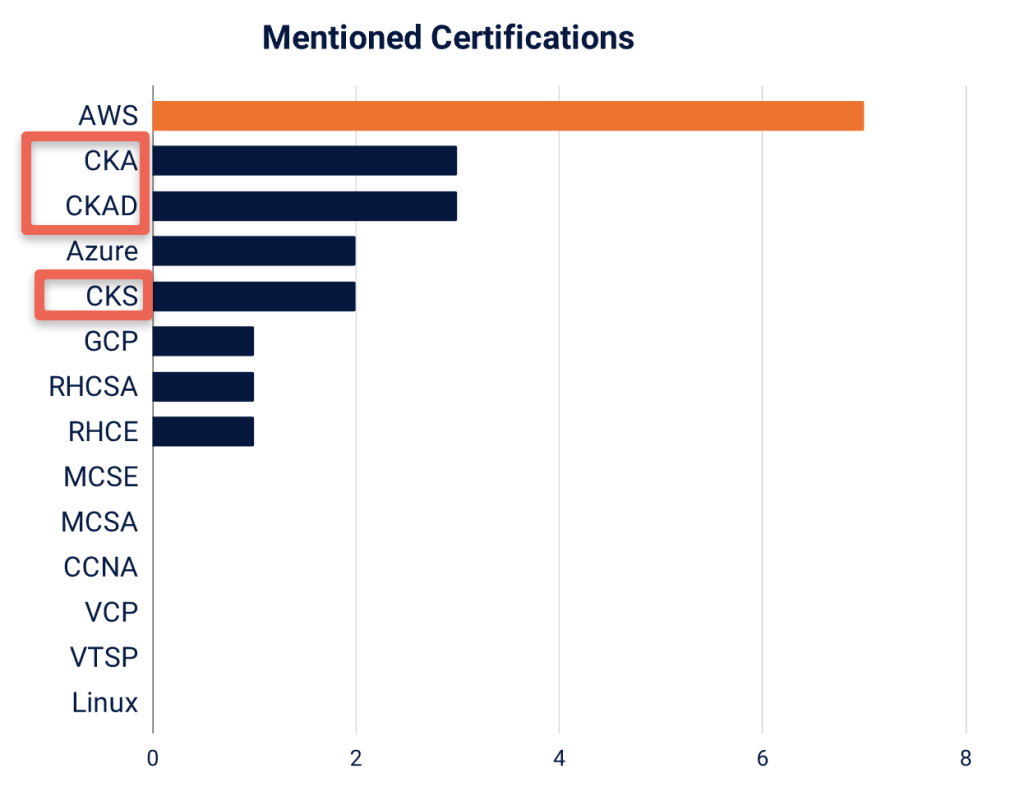Looking for the best Kubernetes certification for 2022? In this guide, I explained the best Kubernetes certification along with other free choices, so you can choose the best one for you.
Kubernetes is growing in popularity day by day. A survey conducted by Cloud Native Computing Foundation (CNCF) reported that 96% of the respondents are either using or evaluating Kubernetes.
Engineers getting certified on Kubernetes are also growing at a rapid pace. A report by Kube careers shows that Kubernetes Certifications stand in second place in the list of popular certifications.
Now you know why getting certified in Kubernetes is very important. I will be running through each certification, plus an explanation on what purpose each certification is best suited to – everything you need to choose the best Kubernetes certification for your needs.
Also, CNCF certifications under The Linux Foundation are widely accepted and considered by organizations. However, sometimes, certification is about learning and gaining experience. As long as learning is your objective, you can choose to prepare for certifications that add value to your career. So I will also cover certifications that is not part of CNCF but will help you enhance your skill related to Kubernetes.
🚀 Important Note: Kubernetes certification cost increases from August. You can save up to $200 today on certifications using the ongoing sysadmin sale.
What are the Best Kubernetes Certifications?
1. Certified Kubernetes Administrator (CKA)
CKA is my #1 choice for Kubernetes certification.
CKA certification is a sought-after certification when it comes to DevOps Engineer Jobs. Whether you are an experienced IT professional or a fresh college graduate, CKA certification will add value to your resume. It is mainly due to the nature of the exam. Unlike other certifications where exams have multiple-choice questions, CKA is a hands-on certification exam where you need to solve Kubernetes tasks and solve cluster issues from the command line. This certification is aimed at sysadmins and DevOps engineers who are involved with day-to-day Kubernetes operations.
The Certified Kubernetes Administrator (CKA) program provides assurance that CKAs have the skills, knowledge, and competency to perform the responsibilities of Kubernetes administrators.
training.linuxfoundation.org
CKA exam focuses on the following domain and competencies.
- Storage
- Troubleshooting
- Workloads & Scheduling
- Cluster Architecture, Installation & Configuration
- Services & Networking
Check out the CKA Study Guide where I have given the detailed CKA exam resources and links to Kubernetes official documentation.
2. Certified Kubernetes Application Developer (CKAD)
I recommend CKAD certification for all developers & engineers who focus more on cloud-native microservices application development & deployment.
CKAD certification focuses more on the application aspects of Kubernetes. If you are a developer or a Devops engineer who wants to showcase your ability to deploy applications on Kubernetes with cloud-native best practices, CKAD certification is for you.
The Certified Kubernetes Application Developer (CKAD) exam certifies that candidates can design, build and deploy cloud-native applications for Kubernetes.
training.linuxfoundation.org
It is also a performance-based hands-on exam where you need to solve Kubernetes tasks related to cloud-native application deployment on Kubernetes. CKAD covers the following Domains & Competencies
- Application Design and Build
- Application Deployment
- Application Observability and Maintenance
- Application Environment, Configuration, and Security
- Services and Networking
Check out the comprehensive CKAD Study Guide where I have given the detailed CKAD exam resources and links to Kubernetes official documentation.
3. Certified Kubernetes Security Specialist (CKS)
CKS exam is recommended for engineers involved in cloud-native security.
CKS certification focuses more on Kubernetes security. When it comes to containerized environments, security plays a key role. From building a container image to deploying it on kubernetes, security best practices have to be applied to reduce the attack surface. This certification covers the security aspects from building images to deployment. You have to learn container security best practices and associate cncf security tooling such as Falco and Trivy to prepare of this exam.
The Certified Kubernetes Security Specialist (CKS) program provides assurance that a CKS has the skills, knowledge, and competence on a broad range of best practices for securing container-based applications and Kubernetes platforms during build, deployment and runtime. CKA certification is required to sit for this exam.
training.linuxfoundation.org
To appear for the CKS exam, you need to pass the CKA certification first. CKS exam covers the following domains and competencies.
- Cluster Setup
- Cluster Hardening
- System Hardening
- Minimize Microservice Vulnerabilities
- Supply Chain Security
- Monitoring, Logging and Runtime Security
Check out the comprehensive CKS Study Guide where I have given the detailed CKS exam resources, links to Kubernetes official documentation, and links to associate cncf security tools mentioned in the CKS curriculam
4. Kubernetes and Cloud Native Associate (KCNA)
KCNA is recommended for students, IT managers, and engineers who need foundational knowledge of the cloud-native ecosystem.
KCNA exam focuses on Kubernetes and related tools in the cloud-native landscape. This exam is easy as compared to CKA, CKAD, and CKS. It is a multiple-choice exam with 60 questions and a 90 minutes exam time.
The Kubernetes and Cloud Native Associate (KCNA) exam demonstrates a user’s foundational knowledge and skills in Kubernetes and the wider cloud native ecosystem.

